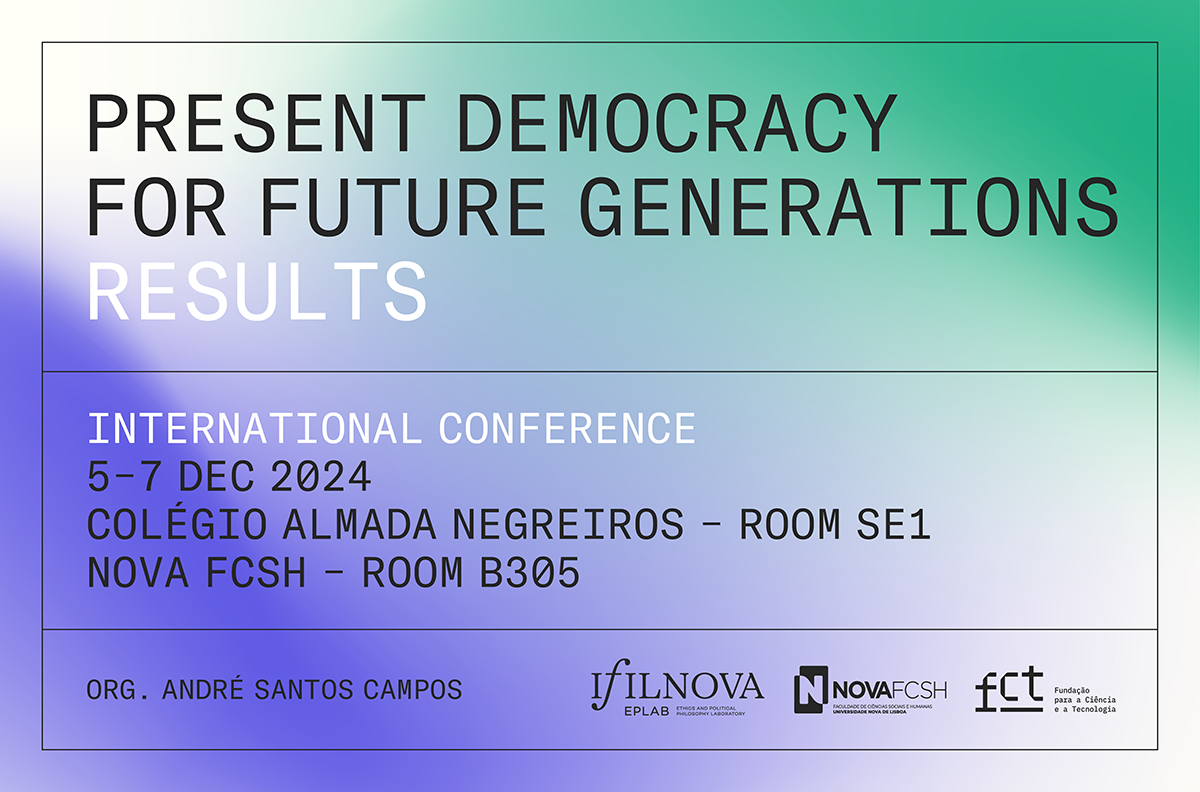Present Democracy for Future Generations — Results

The FCT-funded project ‘Present Democracy for Future Generations’, which ran between January 2021 and December 2024, focused on the possibility of reconfiguring certain key concepts that originated in modern democratic theory, most forcefully by expanding their timescale in favour of the far-off future. This involved exploring the cross-temporal range of standard concepts in political theory (e.g., rights, justice, equality, legitimacy, sovereignty) in such a way as to assess their viability in a world order that must overcome presentism to solve its most pressing problems without being willing to give up its fundamental liberal-democratic culture. The main hypothesis to be tested was that of determining whether contemporary democracies’ bias towards the short term is systemic and necessary to the liberal democratic project, or whether they already contain the conceptual and institutional instruments that allow for some sort of long-term strategic decision-making in favour of the far-off future. This final conference aims at displaying the main findings of the research team.
Org. André Santos Campos
Programme
5 DECEMBER 2024
ROOM SE1 (Colégio Almada Negreiros, Campus Campolide)
14h00 Opening remarks
14h15 Catherine Moury (NOVA FCSH), Damned If You Do, Damned If You Don’t: The Politics of Pandemic Preparation as a Grand Challenge
14h55 José Rodrigues Gusmão (NOVA FCSH), Getting Future Generations within the scope of Rawls’ Law of Peoples
15h35 José Pereira (NOVA FCSH), Loving the Future
16h15 Coffee Break
16h30 Catarina Santos Botelho (Catholic University of Porto), Constitutional Challenges of Intergenerational Justice
17h10 Giovanni Damele (NOVA FCSH), On Hans Jonas’ The Imperative of Responsibility
6 DECEMBER 2024
ROOM SE1 (Colégio Almada Negreiros, Campus Campolide)
9h30–11:00 Book panel on André Santos Campos’ The Semi-Future Democracy. A Liberal Theory of the Long-term View (2024)
9h30 Brief presentation by the author – André Santos Campos (NOVA FCSH)
9h40 Manuel Sá Valente (University of Minho), Discussion of Chapter 1: Multitemporal Democracy
10h20 Ludvig Beckman (Stockholm University), Discussion of Chapter 2: Bringing the Future into the Present
11h Coffee Break
11h15 Devon Cass (University of Manchester), Discussion of Chapter 3: The Semi-Future Temporal Order
11h55 Nicola Mulkeen (University of Newcastle), Discussion of Chapters 4 and 5: Semi-Future Representation and Accountability
12h35 Catarina Neves (Utrecht University), Discussion of Chapter 6: Semi-Future Policymaking
ROOM B305 (NOVA FCSH, Campus Berna – Tower B)
15h30 Iñigo González-Ricoy (University of Barcelona) and Pablo Magaña Fernández (Trinity College London), Intergenerational Subjection
16h10 Michael Rose (Leuphana University Lüneburg), Institutional Proxy Representatives of Future Generations: A Comparative Analysis of Types and Design Features
16h50 Sofia Guedes Vaz (NOVA FCSH), Prospection as a Sustainability Virtue: Imagining Futures for Intergenerational Ethics
7 DECEMBER 2024
ROOM SE1 (Colégio Almada Negreiros, Campus Campolide)
10h00 Presentation of the book Desafios de Governar para o Futuro (eds. Giovanni Damele, Inês Cisneiros, Sofia Estudante)
10h10 Inês Pinheiro (NOVA FCSH), Thoughts on the Timelessness of Democratic Responsibility
10h50 Sofia Estudante (NOVA FCSH), Generational Autonomy
11h30 Coffee Break
11h45 Inês Cisneiros (NOVA FCSH), Is Sisyphus happy? Democracy as an intergenerational endeavour
12h25 Zachariah Tailor (University of Lisbon), Destituent Gestures for Different Futures
Event supported by the Foundation for Science and Technology (Fundação para a Ciência e para a Tecnologia) of the Portuguese Ministry of Education and Science under the project “Present Democracy for Future Generations” (PTDC/FER-FIL/6088/2020).

